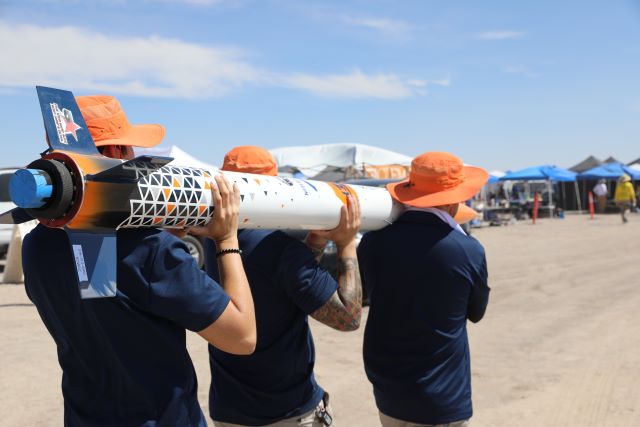
Recently, the 2023 Spaceport America Cup, an international rocketry competition in New Mexico, saw participation from over 5,000 students worldwide. Among them were students from The University of Texas at El Paso (UTEP), who formed the Sun City Summit Rocket Team.
The Spaceport America Cup showcased student engineering and sportsmanship at a commercial launch site in the middle of the desert. Spaceport America is a facility built by the state of New Mexico to serve as a commercial launchpad for satellites, spaceships, and other space-bound vehicles. The weeklong event celebrated rocket engineering.
Despite facing challenges, the UTEP team launched their rocket, Daedalus, and secured a respectable 57th position out of 159 teams. The event was a testament to the students’ engineering skills, innovation, and sportsmanship.
UTEP’s Sun City Summit Rocket Team competed in the 10,000 feet commercial bracket, one of six award categories based on launch height, type of propulsion fuel, and fueling system.
The UTEP students had been preparing for months to design, source parts, and build a functional rocket that could successfully take off and carry a payload.
The rocket, named Daedalus after a Greek mythological figure, was assembled in the desert just hours before the launch. Despite periodic dust storms that paused launches and sent dirt flying over every available surface, the team patiently waited for hours in the heat for their turn to launch.
Daedalus reached an apogee of approximately 8,946 feet and successfully deployed its payload, a system that emerged from the rocket to deposit ink on a board and simulate 3-D printing in a dynamic environment.
Although the team secured the 57th position, they displayed exceptional sportsmanship throughout the competition, sharing supplies and know-how with other teams, cheering on their competitors, and even helping a student from another university who ran out of gas before reaching the Spaceport site.
The success of a rocket launch in competition depends on how well it performs during takeoff and whether its parts can be retrieved once it returns to the ground.
Valeria Loza Arango, a mechanical engineering junior at UTEP, led the recovery team, which took roughly two hours to recover the rocket by searching the desert for it and carrying it back to its designated area.
Although the rocket landed in a cactus, it suffered minimal damage, and Loza Arango plans to continue serving as the recovery team lead and participate in the team again next year.
For Jonathan Cucciniello, the Spaceport America Cup was a fun and surreal experience. As a U.S. Army veteran who graduated in May with his bachelor’s degree in mechanical engineering, he helped start the rocket program at UTEP after learning about the competition.
Alejandro Medina, a co-captain of the avionics sub-team, was responsible for the electronics and computer systems installed in the rocket.
During the launch, the team tracked the rocket’s flight data and then used a built-in GPS to determine where it landed so they could recover it. Despite the challenges, he enjoyed getting to know his teammates through the process and seeing them work together toward a common goal.
UTEP is in the house! After months of hard work, our @UTEPRocketTeam successfully launched their rocket, Daedalus, today at the 2023 @Spaceport_Cup. Congratulations, team! 🚀 pic.twitter.com/lzhsDICggT
— UTEP (@UTEP) June 22, 2023
Check out the moment when @UTEPRocketTeam launched their rocket Daedalus at @Spaceport_Cup! 🚀 The rocket was designed by future aerospace engineers who are at the world’s largest student rocketry competition, taking place this week. pic.twitter.com/uJWNs5F5Te
— UTEP (@UTEP) June 23, 2023
Today was a very successful first day at the launch site of the @Spaceport_Cup as the @UTEPRocketTeam prepares to launch their rocket, Daedalus, 10,000 feet into the air. Stay tuned! #UTEPRocketTeam #SpaceportAmericaCup pic.twitter.com/e6qLGiqoal
— UTEP (@UTEP) June 21, 2023
The U.S. Army Corps of Engineers has been tasked with…
Brown and Caldwell, a leading environmental engineering and construction firm,…
Humboldt State University, one of four campuses within the California…